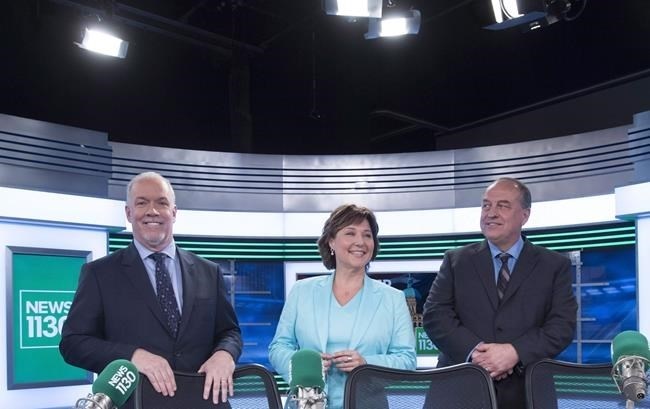
B.C. NDP leader John Horgan, left to right, Liberal Leader Christy Clark and B.C. Green Party leader Andrew Weaver pose for a photo following the leaders radio debate in Vancouver, B.C., April 20, 2017.
Image Credit: THE CANADIAN PRESS/Jonathan Hayward
April 26, 2017 - 6:00 AM
VICTORIA - It's show time in British Columbia's election campaign with Wednesday's debate between the three party leaders offering a high-stakes chance to leave a mark on the campaign with about two weeks to the finish line.
The debate is one of the few opportunities the leaders have to directly challenge each other, all the while under the intense glare of live TV cameras where body language counts as much as scoring verbal points.
It's a pressure-cooker audition where solid performances and unscripted moments can inspire voters and shift campaigns.
Christy Clark's Liberals have mounted a largely stay-the-course campaign so far, highlighting their stewardship of Canada's top-performing economy and posting five consecutive balanced budgets.
The New Democrats under John Horgan are trying to persuade voters that after 16 years of Liberal governments, British Columbia needs a change, running on the slogan that the NDP will run a government that's on the side of the little guy and not beholden to corporations and wealthy individual donors.
Horgan's promises to drop tolls on two Vancouver-area bridges, freeze hydro rates and eliminate medical services premiums drew dire warnings from the Liberals about higher taxes and deficits.
READ MORE: Key developments from Day 15 on the campaign trail
Green Leader Andrew Weaver said he plans to stick to the issues and stay away from the acrimonious exchanges between Horgan and Clark that were featured in last week's radio debate.
"I'm looking forward to that clash," said Weaver, a climate scientist and university professor. "But I will not degrade the debate to the level of personal insults."
The radio debate might be remembered for a moment when Horgan asked Clark not to touch him after she put her hand on his arm and told him to calm down. Weaver, meanwhile, raised his hand to get the moderator's attention.
"I love to debate policy," said Weaver. "I found that debate utterly disrespectful between the two leaders. We're not going to go down that rabbit hole. We'll let them fight it out."
The New Democrats say the debate is an important event in the campaign leading up to the May 9 election.
"Debates matter and the performance matters," said Glen Sanford, the NDP's deputy director. "It's the time when British Columbians will really tune into the campaign."
On Sunday, Clark said she's optimistic about her party's chances but acknowledged the race still has a long way to go.
"There's a reason there are 28 days in a campaign, because we spend every day talking about the things that we stand for and the things that we believe in," Clark said.
Norman Ruff, a retired political scientist, said most people don't watch an entire debate but the sound bites and news stories about its defining moments could dominate the campaign for days.
He said the Liberals are courting danger by running the same steady-as-she-goes campaign as they did in 2013.
But Ruff said the mood for change in B.C. does not appear to be as large of a factor as it was in 1991 when the Social Credit dynasty was defeated by the New Democrats or in 2001 when the Liberals decimated the NDP.
He described the political mood at those times as one of "revulsion."
"I don't think that the Clark government has really crossed the line and lost legitimacy in the way the Socreds did and the NDP did," he said. "Yet things could still change."
News from © The Canadian Press, 2017